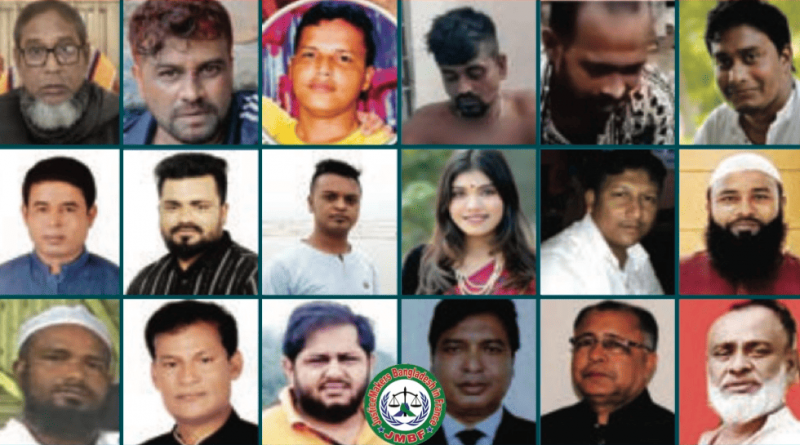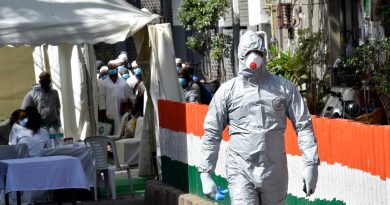Paris’ JMBF Report Exposes 70 Extrajudicial Killings Under Yunus’s Interim Government
Paris — France-based human rights organization JusticeMakers Bangladesh in France (JMBF) today published its Annual Report 2025 on extrajudicial killings and custodial deaths during the first year of the interim government led by Nobel Peace Laureate Muhammad Yunus in Bangladesh.
The report focused on human rights violations, particularly extrajudicial killings and custodial deaths committed by law enforcement personnel as well as prison authorities during the period from August 2024 to July 2025.
The report was prepared based on the research of JMBF Executive Committee member Ms. Jannatul Ferdous and edited by JMBF’s founding president, Advocate Shahanur Islam. It compiled information on 70 deaths in 60 incidents across the country, where extrajudicial killings and custodial deaths occurred at the hands of law enforcement agencies, prison authorities, and other security forces.
According to the published information, among the deceased, 55% (43 people in 33 incidents) died directly at the hands of security forces, while 45% (27 people) died in prisons, mainly due to torture in police remand and medical negligence. Almost all of the deceased were leaders, activists, or supporters of the Bangladesh Awami League, although minority communities, workers, and non-political citizens were also victims of killings.
The report mentioned that during a peaceful protest rally in Gopalganj, the army opened fire and killed five people. In addition, in Gaibandha and Gopalganj, Awami League supporters were killed through brutal physical torture by joint forces. In Khagrachhari, three indigenous people were killed by joint forces’ firing following a communal attack.
Furthermore, six leaders and supporters were killed in various prisons due to physical torture in police remand. In Dhaka, two garment workers, including one woman, were killed in police firing during a wage movement. In Barishal, a child was killed in Rapid Action Battalion (RAB) firing. In Bogura prison, five leaders lost their lives due to medical negligence.
JMBF’s observation showed that the highest number of incidents occurred in Dhaka Division, where 23 incidents caused 28 victims. After that, in Chattogram, 21 people were killed in 17 incidents. This means that 70% of the total incidents occurred in politically important regions like Dhaka and Chattogram, the report stated.
Apart from this, significant incidents also occurred in Rajshahi, Khulna, Sylhet, Rangpur, Barishal, and Mymensingh divisions, though fewer in number. While in Dhaka and Chattogram more people died directly at the hands of security forces, in Rajshahi custodial deaths were higher.
According to the report, besides the police, the army, joint forces, Rapid Action Battalion (RAB), Coast Guard, Navy, Air Force, intelligence agencies, and the Department of Narcotics Control were also involved in these incidents. This wide involvement indicates that the problem is not isolated accidents, but rather the result of a massive failure of accountability of state agencies, JMBF believes.
Among the causes of death, torture and subsequent deaths in prisons following torture in remand accounted for the highest number. After that, many were killed by direct shooting, JMBF mentioned in the published report.
In addition, it noted that with specific intent and purpose, leaders, activists, and supporters of the opposition political ideology Bangladesh Awami League, and inhabitants of indigenous communities in the Chittagong Hill Tracts, were deliberately killed through official negligence and medical negligence.
The deceased were not limited only to political opponents. Almost half of the deceased were affiliated with Bangladesh Awami League politics, while the rest were members of the Bangladesh Nationalist Party (BNP), hill-based political parties, or ordinary citizens without political affiliation. This shows that custodial deaths are not only politically targeted but also pose risks for all citizens in state custody, the report stated.
According to the report, out of 70 deaths in extrajudicial killings and custodial deaths, families of only seven victims were initially able to take legal steps. The remaining 63 families—that is, 90% of the families—could not take legal action due to fear and a repressive environment. JMBF described this situation as a “deeply entrenched culture of impunity.”
This situation perpetuates a culture of immunity in the country and further reduces people’s trust in state institutions. The report also mentioned that although the interim government admitted the need for reforms in law enforcement and the judiciary, progress is slow and no effective steps have yet been taken.
Robert Simon, a prominent French human rights activist and chief advisor of JMBF, said, “This report is not only a record of atrocities committed in Bangladesh but also a roadmap for accountability. The international community must recognize that ongoing extrajudicial killings and custodial deaths in Bangladesh are not isolated incidents—they are part of a planned attack on human rights and democracy. If urgent action is not taken now against these incidents, Bangladesh will very soon turn into a fascist state, which is extremely alarming.”
Advocate Shahanur Islam, prominent human rights lawyer and founding president of JMBF, said, “Instead of keeping promises, the Yunus administration has turned state institutions into tools of repression. Police, army, and prison authorities are carrying out human rights violations with complete impunity, while the judiciary has been compromised. An almost autocratic situation has been created in Bangladesh, and the silence of the international community is encouraging this repression.”
In its report, JMBF, through urgent recommendations, called upon the interim government to immediately stop all kinds of extrajudicial killings and custodial torture, to form an independent international investigation commission, and to bring the accused to justice under existing law.
In addition, the JMBF report called for the restoration of judicial independence, strengthening of social organizations, and appealed to the international community, such as the United Nations, European Union, International Criminal Court, and foreign governments, to identify and impose sanctions on the accused, suspend security cooperation, and consider referring the situation in Bangladesh to the International Criminal Court.



